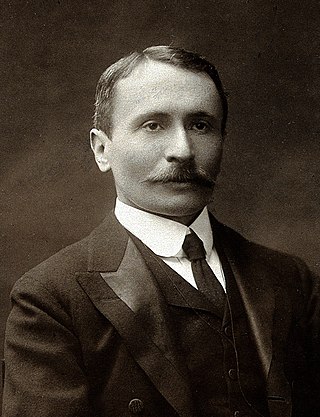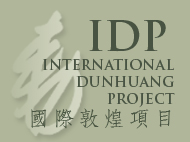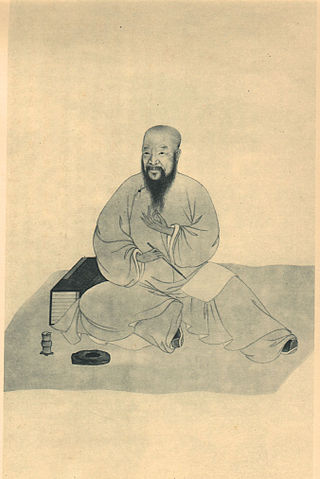
Sir Marc Aurel Stein,(Hungarian:Stein Márk Aurél;26 November 1862 –26 October 1943) was a Hungarian-born British archaeologist,primarily known for his explorations and archaeological discoveries in Central Asia. He was also a professor at Indian universities.

The Mogao Caves,also known as the Thousand Buddha Grottoes or Caves of the Thousand Buddhas,form a system of 500 temples 25 km (16 mi) southeast of the center of Dunhuang,an oasis located at a religious and cultural crossroads on the Silk Road,in Gansu province,China. The caves may also be known as the Dunhuang Caves;however,this term is also used as a collective term to include other Buddhist cave sites in and around the Dunhuang area,such as the Western Thousand Buddha Caves,Eastern Thousand Buddha Caves,Yulin Caves,and Five Temple Caves. The caves contain some of the finest examples of Buddhist art spanning a period of 1,000 years.

The Diamond Sutra is a Mahāyāna (Buddhist) sutra from the genre of Prajñāpāramitā sutras. Translated into a variety of languages over a broad geographic range,the Diamond Sūtra is one of the most influential Mahayana sutras in East Asia,and it is particularly prominent within the Chan tradition,along with the Heart Sutra.

Chiang Hsiao-yen or John Chiang,formerly surnamed Chang,is a Taiwanese politician affiliated with the Kuomintang. He is the speculated illegitimate son of Chiang Ching-kuo,former leader of the Republic of China,which would make him the grandson of Chiang Kai-shek.

Chiang Wei-kuo,also known as Wego Chiang,was the adopted son of Republic of China President Chiang Kai-shek,the adoptive brother of President Chiang Ching-kuo,a retired Army general,and an important figure in the Kuomintang. His courtesy names were Jian'gao (建鎬) and Niantang (念堂). Chiang served in the Wehrmacht before fighting in the Second Sino-Japanese War and Chinese Civil War.

Wang Yuanlu was a Taoist priest and abbot of the Mogao Caves at Dunhuang during the early 20th century. He is credited with the discovery of the Dunhuang manuscripts and was engaged in the restoration of the site,which he funded with the sale of numerous manuscripts to Western and Japanese explorers.

Jiang Wan,courtesy name Gongyan,was a Chinese military general,politician,and regent of the state of Shu during the Three Kingdoms period of China. Born in the late Eastern Han dynasty,Jiang Wan initially served as a scribe,county chief and county prefect under the warlord Liu Bei,who later became the founding emperor of Shu. After Liu Bei's son Liu Shan succeeded his father as emperor in 223,Jiang Wan gradually rose to prominence under the regency of Zhuge Liang,the Imperial Chancellor of Shu. Between 228 and 234,while Zhuge Liang was away leading Shu forces on the Northern Expeditions against Shu's rival state Wei,Jiang Wan took charge of internal affairs and provided logistical support to the Shu forces at the frontline. After Zhuge Liang's death in 234,Jiang Wan succeeded him as regent and did well in gaining the Shu people's confidence and leading them into a post-Zhuge Liang era. During this time,he considered that the land-based route through the Qin Mountains used by Zhuge Liang during the Northern Expeditions was too difficult for navigation and transportation of supplies. He thus came up with a plan to switch to a water-based route along the Han River targeting Wei territories in present-day southern Shaanxi and northwestern Hubei. However,the Shu government rejected his plan as they thought it was too risky. In 243,due to poor health,Jiang Wan relocated from Hanzhong near the Wei–Shu border to Fu County. Towards the final years of his regency,as his health worsened,Jiang Wan gradually relinquished his powers to his deputies Fei Yi and Dong Yun but he continued to rule as regent in name. He died in 246 and was succeeded by Fei Yi.
The 14th Central Committee of the Chinese Communist Party was in session from 1992 to 1997. It held seven plenary sessions. It was preceded by the 13th Central Committee. It was elected by the 14th National Congress of the Chinese Communist Party and in turn elected the 14th Politburo of the Chinese Communist Party.

The International Dunhuang Project (IDP) is an international collaborative effort to conserve,catalogue and digitise manuscripts,printed texts,paintings,textiles and artefacts from the Mogao caves at the Western Chinese city of Dunhuang and various other archaeological sites at the eastern end of the Silk Road. The project was established by the British Library in 1994,and now includes twenty-two institutions in twelve countries. As of 18 February 2021 the online IDP database comprised 143,290 catalogue entries and 538,821 images. Most of the manuscripts in the IDP database are texts written in Chinese,but more than fifteen different scripts and languages are represented,including Brahmi,Kharosthi,Khotanese,Sanskrit,Tangut,Tibetan,Tocharian and Old Uyghur.
Tangutology or Tangut studies is the study of the culture,history,art and language of the ancient Tangut people,especially as seen through the study of contemporaneous documents written by the Tangut people themselves. As the Tangut language was written in a unique and complex script and the spoken language became extinct,the cornerstone of Tangut studies has been the study of the Tangut language and the decipherment of the Tangut script.

Heye Town is a rural town in Shuangfeng County,Hunan Province,People's Republic of China. The town is bordered to the north by Jingzi Town,to the northeast by Shigu Town of Xiangtan County,to the southeast by Xinqiao Town of Hengshan County,to the west by Shiniu Township,and to the south by Xijiang Township of Hengyang County.
Hunan Mass Media Vocational and Technical College is a college located in Changsha,Hunan,China.
Fang Quan,courtesy name Peiqing (培卿),was a late Qing Empire Mandarin,scholar,author and educator.

Chiang Wan-an,also known as Wayne Chiang,is a Taiwanese politician who has served as the mayor of Taipei since December 2022. He is the son of former Vice Premier John Chiang,and is believed to be a great-grandson of former President of the Republic of China Chiang Kai-shek. He is the youngest mayor of Taipei since the appointment of Chang Feng-hsu.

V-Focus is a 2016 Taiwanese television series starring Melvin Sia,Ling Hung,Huang Wei Ting and Yorke Sun. Filming began on September 21,2016,and is filmed as it airs. The original broadcast began on October 26,2016,on SET Metro,airing weekdays at 8:00 pm.

The Inn is a Chinese variety show aired on Hunan Broadcasting Station. In the variety show,a couple will manage an inn with a company of friends as guest for 20 days. The Inn shared the same production team with another variety show by Hunan Broadcasting System,Divas Hits The Road.
Wang Jinsong is a Chinese actor best known for his television roles in Ming Dynasty in 1566 (2007),Nirvana in Fire (2015),Sparrow (2016),The Advisors Alliance (2017) and The Thunder (2019).
Jiang and Chiang is a Chinese surname. In 2019,it was the 39th most common surname in mainland China. It is listed 13th in the Hundred Family Surnames poem.

Chen Weisong,also called Chen Qinian (其年) or Chen Jialing (迦陵),lived 1626 January 7-1682 June 13,was the first of the great Ci and Pianwen poets during the Qing dynasty. He was the leader and founder of the Yangxian poetry school.
Events from the year 2023 in Taiwan,Republic of China. This year is numbered Minguo 112 according to the official Republic of China calendar.













